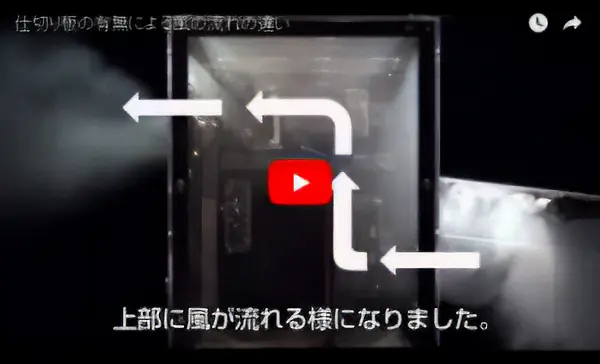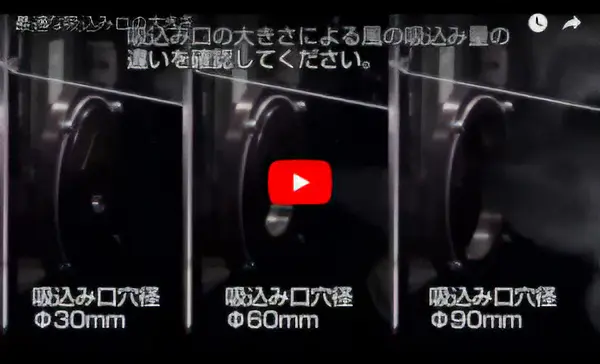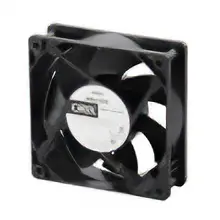Learn the Basics of Control Cabinet Design from the Principle of Air Flow!


-

What is it, Vex? What are you worried about with a difficult face?
-

I'm supposed to give a workshop on cooling control cabinet, but I don't know what is the point of control cabinet design at the first place.
-

It's important to understand "air flow" in order to cool the control cabinet with efficiency.
Today, let's review the three main points of control cabinet design, focusing on the principle of air flow. By the way, do you remember the proper position to install the fan? -

Of course! You put a discharge fan on the top to expel warm air, and attach an intake port or intake fan on the bottom to bring in a cold air.
-

Exactly! The first point is to "understand the characteristics of warmed air."
Cold air has a characteristic where it tends to flow upward when it is warmed. Consider that equipment installed in the control cabinet should also be arranged with this characteristic. In general, PLC, which serve as the brains of the control equipment, are arranged in a low position to avoid deterioration of the lifetime of the capacitors. The driver that controls the motor is above it. It's more effective to place device that generate heat, such as power supply systems (breakers, transformers), and relays that are less affected by heat, in higher position.●Control cabinet example 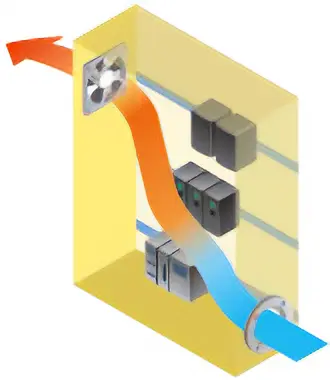
-

I've heard from the customers that they often have trouble with overheating alarms from the "same part of the driver." That driver seems to have been installed at the top, but I can't figure out the cause...
-

The second point is to "send the air to the desired location."
Maybe this is the reason why it's not done correctly. Here's a video of an experiment with smoke, so let's take a look at it first.Watch the video to see the features.
-
●Inside the customer's control cabinet 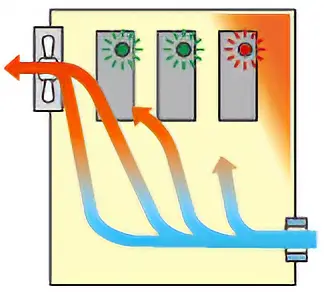
-
●When a divider is installed 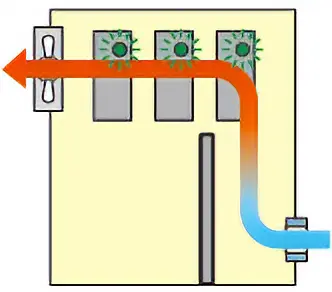
-
-

There wasn't much air (wind) flowing to the driver (upper right corner of the board) where the alarm was coming from.
-

That’s right. If you just install a fan, it may not be able to send the air to the place you want to cool.
Therefore, the divider is installed to create the air flow. -

It means to make sure that the air flow is towards the place you want to cool.
-

That's right! Now, the last point is "replace the air efficiently."
Here's the question. Which of the ABC's do you think has a larger intake that can take in air with more efficiency?
| enclosure | A | B | C |
|---|---|---|---|
 |
 |
 |
|
| Exhaust outlet > Intake | Exhaust outlet = Intake | Exhaust outlet < Intake | |
| Intake Volume | Less for B | - | No change to B* |
- *If the capacity of the motor cooling fans is saturated, there will be no change in the suction amount.
-

The bigger the intake, the more air comes in, so it's a C.
-

It's wrong. The answer is B!
The amount of air sucked in is determined by the capacity of the fan attached to the exhaust outlet. If the intake is as large as the fan's mounting hole area, almost the same amount of air will enter as the discharge volume, so you can replace the air efficiently. Just because you increase the size of the intake doesn't mean more air will come in.Watch the video to see the features.
-

Now I get it!
-

In fact, if there are a lot of devices placed inside the control cabinet, it will be difficult for air to flow through, so we have to take that into consideration. Do you remember what I taught you before about a measure to deal with this kind of high pressure loss?
-

I'll review.
-

Oh, Vex... In addition, to select a fan, you need to consider not only the mounting density, but also the size and material of the control cabinet and the heat generation of the equipment, so it is important to confirm the conditions.
-

Hmmm, fan selection seems difficult with many things to consider...
But Oriental Motor offers a motor sizing service, so there's no need to worry. -

That's right. You can use the website, fax, e-mail, or phone for free, and our dedicated staff will help you to find the best product. Furthermore, there is a technical support tool on the website that allows customers to calculate the required air flow by themselves.
-

That's right! I hope the customer can make use of it!
